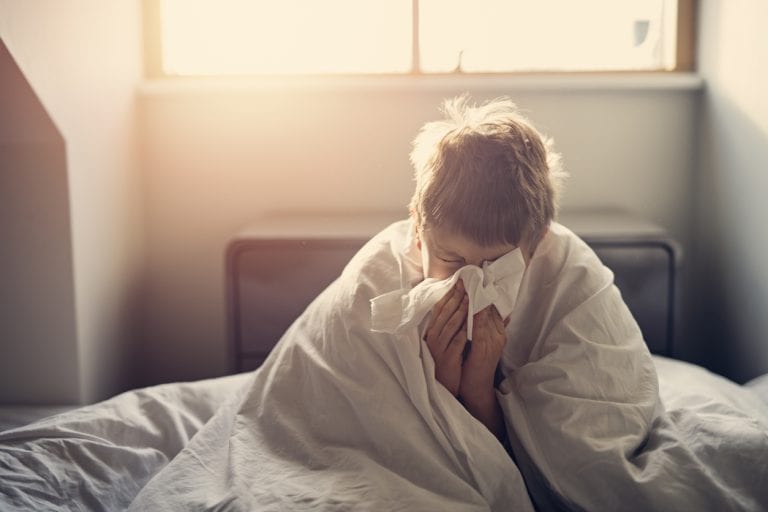Is a Sore Throat an Early Flu Symptom?
January 2, 2019

Modified January 16, 2026
It’s important to pay attention to symptoms and know when a sore throat may be something trivial or indicate something worse.
Is that itch in your throat just an itch, or something more? It’s important to pay careful attention to symptoms and know when a dry and scratchy throat may actually be something trivial… or indicate a case of strep throat, tonsillitis, or the flu. Since flu season is upon us, now is a great time to learn more about potential conditions associated with sore throat and flu symptoms.
Each flu season, approximately 5-20 percent of the population comes down with this viral infection, and it puts about 200,000 of them in the hospital each year.
A sore throat is actually a common symptom of many conditions that CareSpot treats. There are annually 13 million doctor visits for a sore throat; many of which could be treated with simple home remedies.
Common Causes of a Sore Throat
A sore throat is annoying but the best way to treat it is to understand the reason for it. A sore throat might be the result of a common cold, dry air or allergies. More serious conditions that can lead to a sore throat include bacterial infections such as streptococcus and tonsillitis. Cases such as these may require a visit to the pediatrician or a primary care doctor; surgery is usually needed for those with severe and recurring cases of tonsillitis.
A sore throat can also be brought on by non-flu viruses, such as measles, chickenpox, mononucleosis, and the croup. These are just a few of the sore throat possibilities, and no single treatment can be used to cure them all. Using the wrong treatment can even have damaging effects on your health in some situations, which is why it is important to understand the underlying cause of your sore throat.
Bacterial infections can be cured with antibiotics, as opposed to a virus, which requires antivirals or other over-the-counter medications. Never treat a viral infection, such as the flu, with antibiotics as this can decrease their effectiveness over time.
Some sore throat remedies include:
- A humidifier or oral analgesic spray for sore throats due to dry air
- Reducing exposure to irritants for those with allergies
- Penicillin and other antibiotics for bacterial infections
- Tylenol and other over-the-counter pain relievers for viral infections, the most common cause of a sore throat.
- Gargling warm salt water
- Sucking on analgesic lozenges
- Drinking tea with honey or broth
- Drinking extra water
- Sitting in a shower
- Getting plenty of rest
Symptoms of the Flu
You know your sore throat is the flu when your symptoms are far greater than just a sore throat. Influenza is a viral infection, so there isn’t much you can do once you’ve been exposed. It is easier to address the flu when you are able to catch it early on. Some early symptoms include:
- Body aches and chills
- Cough
- Fatigue
- Sore throat
- Gastrointestinal problems
- Fever
- Runny or stuffy nose
Surprising complications that can arise from the flu include:
- Dehydration
- Bronchitis (inflammation of the bronchi, the airways that branch off the trachea)
- Ear infection (more common in children than in adults)
- Myocarditis (inflammation of the heart muscle)
- Myositis (muscle inflammation)
- Pericarditis (inflammation of the sac that surrounds the heart)
- Pneumonia, viral (from the flu virus itself) or bacterial
- Sinus infection (more common in children than in adults)
- Worsening of chronic medical conditions such as asthma, diabetes, or congestive heart failure
Treating the Flu
Once you start to feel these early symptoms, it is good to take precautions to make yourself as comfortable as possible. Get plenty of sleep every night to help your body to fight off the virus; over-the-counter pain medications or antivirals can help with symptoms like body aches and fever; drink plenty of fluids and take cough drops to ease a sore throat; chicken soup, caffeine-free tea and gargling with warm salt water can also help soothe the throat and open up sinuses.
The good news is studies show that if you’re diagnosed within 48 hours, an anti-viral medication may help lessen the severity and duration of the flu. Flu tests for quick diagnosis are available at CareSpot with extended hours, 7 days a week.
The recovery period varies with the flu, and it is important to stay home until symptoms improve and you are fever-free without medication for 24 hours. This can help prevent the spread of the flu virus to others. It is important to remember that antibiotics should never be used to treat the flu or other viruses, only bacterial infections.
The good news is studies show that if you’re diagnosed within 48 hours, an anti-viral medication may help lessen the severity and duration of the flu. Flu tests for quick diagnosis are available at CareSpot with extended hours, 7 days a week.
Flu Virus Prevention
At least 3,000 people in the U.S. die from each year from influenza. To protect yourself and your loved ones, be sure to take preventative measures, especially during the winter months. An annual flu shot is always recommended to everyone over the age of 6 months, and don’t forget to wash your hands frequently, carry hand sanitizer with you, avoid large groups of people if possible, and get plenty of vitamin C.
If your flu symptoms are progressing, or if you need your annual flu shot, plan to visit your nearest CareSpot location today.
